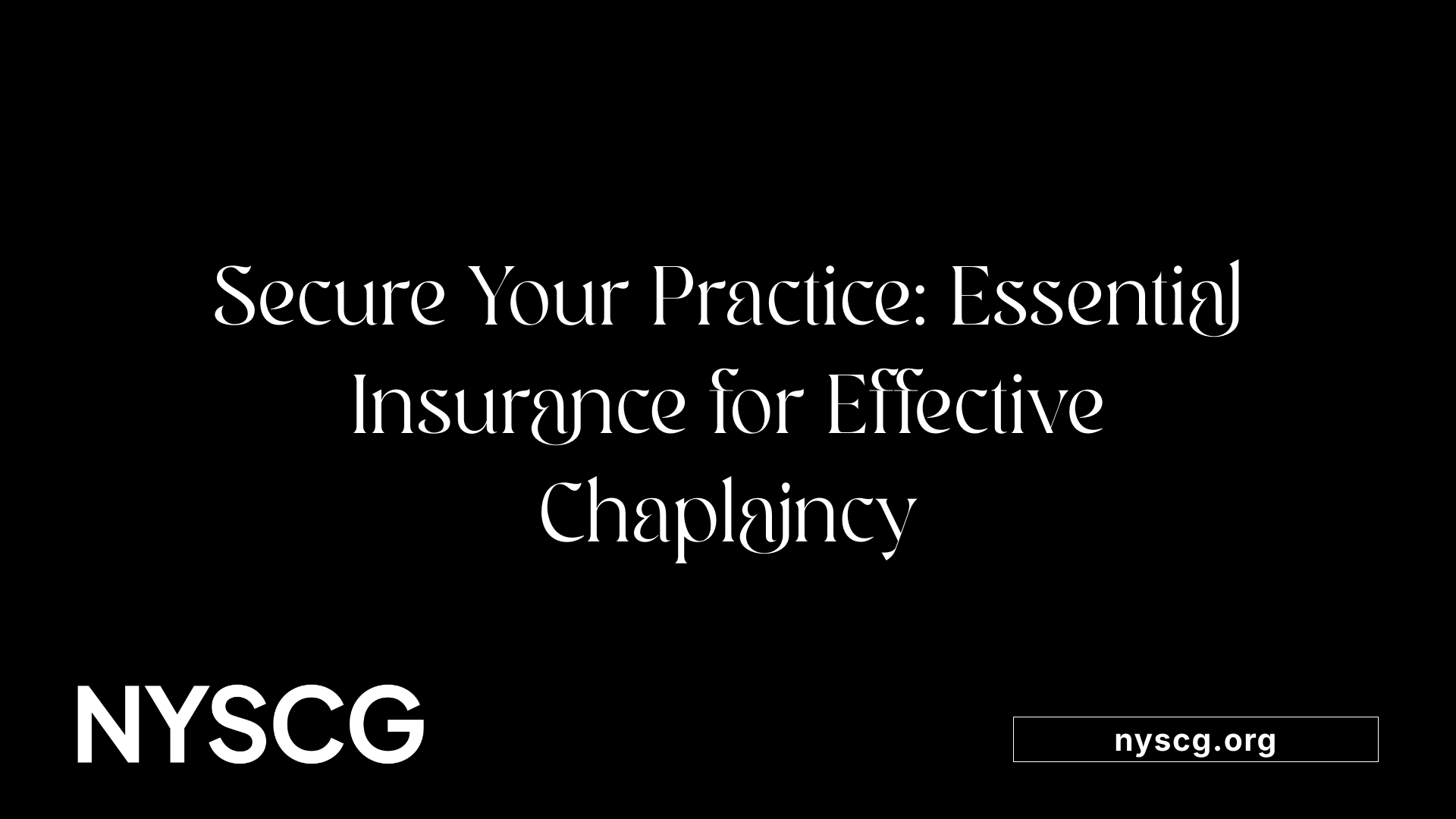What Kind of Insurance Does a Chaplain Need?


Chaplains and pastoral counselors play a vital role in providing spiritual and emotional support across a variety of settings, including hospitals, correctional facilities, and workplaces. To perform their duties effectively while safeguarding their personal and professional interests, understanding the types of insurance coverage available is essential. This article explores the key insurance considerations that chaplains should keep in mind, encompassing liability, malpractice, and specialized protections necessary for their unique roles.

Chaplains and pastoral counselors operate in sensitive environments where legal, ethical, and personal risks are prevalent. To safeguard themselves comprehensively, they should consider a range of insurance coverages tailored to their unique roles.
Primarily, a thorough professional liability or malpractice insurance is essential. This coverage should include protection against claims of negligence, errors, or omissions during their spiritual and counseling services. Limits typically should be up to $2 million per claim and $4 million in total for any claims within the policy period. Such policies often also cover defense costs, licensing board proceedings, and damages.
In addition to malpractice policies, chaplains need protection for confidentiality breaches and privacy issues. HIPAA (Health Insurance Portability and Accountability Act) defenses must be included, especially if they handle patient or client health information.
Physical premises liability insurance is crucial for chaplains working in offices, hospitals, or other facilities. It covers injuries or property damage that occurs on their premises. If providing services in multiple locations, or in virtual settings such as telehealth, coverage should extend to these environments.
First Party Assault and Battery coverage is vital, as it protects against injuries or property damage resulting from client-related incidents. Similarly, medical payments and loss of earnings coverage are important; they help cover medical expenses or replace income if a chaplain cannot work due to a legal claim or injury.
For chaplains involved in telehealth, forensic work, or peer reviews, their insurance needs to encompass these activities as well. Ensuring broad coverage prevents gaps in protection.
Many chaplains work independently or in organizations that do not fully cover the professional risks involved. Therefore, obtaining individual malpractice or liability insurance beyond employer-provided coverage is highly advisable. This ensures personal assets remain protected in case of legal claims.
Overall, choosing the right insurance involves careful evaluation of coverage limits, exclusions, and the specific nature of the chaplain’s duties. Consulting with insurance professionals and reviewing policies thoroughly will help tailor the protection plan.
| Insurance Type | Purpose | Typical Coverage Limits | Additional Features |
|---|---|---|---|
| Professional liability/malpractice | Protects against negligence claims | Up to $2 million per claim, $4 million total | Defense costs, licensing defense, damages |
| Privacy & HIPAA defenses | Protects confidentiality issues | Included in malpractice policies | Confidentiality breaches, legal defense |
| Premises liability | Covers injuries/damage on physical locations | Varies, often $1-2 million | Property damage, bodily injury |
| First Party Assault & Battery | Protects against client-related injuries | Policy specific | Medical expenses, legal defense |
| Medical payments & earnings | Covers treatment and income loss | Varies | Hospital bills, lost wages |
| Telehealth & remote services | Covers virtual interactions | Recommended for telehealth practitioners | Technology-related errors |
Having comprehensive insurance demonstrates professionalism and helps manage the risks associated with providing spiritual and emotional support services.
Chaplain liability malpractice insurance coverage options
By securing suitable coverage, chaplains can focus on their vital mission of providing care and comfort, knowing they are protected against unforeseen legal and financial challenges.

Chaplains, whether providing spiritual caregiving in hospitals, prisons, or workplaces, need a variety of insurance coverages to protect themselves against potential legal claims and operational risks. The broad spectrum of insurance options ensures they can continue their essential work smoothly without the fear of personal financial loss.
One of the primary insurance types for chaplains is professional liability insurance, often called malpractice insurance. This coverage includes legal defense costs, settlements, and damages in case of claims related to negligence, errors, or omissions during their service. Since chaplains frequently handle sensitive patient or client data and provide advice, such protection helps shield their personal assets from lawsuits.
In addition to malpractice insurance, chaplains should consider occupational hazard coverage. This type of insurance protects against work-related injuries or illnesses, which could occur during physical activities, emotional distress, or exposure to hazardous environments. Workplace liability and injury protection are crucial especially for chaplains working in high-stress settings like hospitals or correctional facilities.
Premises liability and privacy protections are also vital. Premises liability covers incidents that might occur on a chaplain’s work site, such as a client slipping or falling, while privacy protections, including HIPAA compliance, ensure the confidentiality of sensitive information like health records or personal disclosures. These coverages help chaplains operate in a legally compliant manner and protect the trust placed in them.
With the rise of telehealth and digital interactions, some chaplains now engage in remote counseling, necessitating coverage for tele-therapy and forensic activities. Insurance policies that include these elements protect against specific risks associated with online or forensic work, such as data breaches, digital misconduct, or liability arising from virtual consultations.
Furthermore, insurance billing and reimbursement are integral for chaplains who accept payments through Medicare, private insurance, or direct patient payments. Proper understanding and management of billing codes, legal compliance with laws like the Mental Health Parity Law, and having insurance coverage that supports reimbursement processes ensure their services are financially sustainable.
These insurance options collectively contribute to a secure and ethical practice by managing professional risks, safeguarding personal assets, and maintaining compliance with legal and ethical standards. Chaplains should evaluate their unique work environment, scope of practice, and client base to select appropriate coverages and consult with insurance professionals for tailored policies.
| Insurance Type | Coverage Focus | Additional Benefits |
|---|---|---|
| Professional liability | Malpractice, legal defense | Defense costs, settlements, damages |
| Occupational hazard | Work-related injuries or illnesses | Medical expenses, rehab, lost wages |
| Premises liability | Incidents on work sites | Property damage, injury claims |
| Privacy protections (HIPAA) | Confidentiality of sensitive information | Data breach response, legal compliance |
| Tele-therapy and forensic | Online and forensic liability, data breaches | Digital misconduct, cyber liability |
| Billing and reimbursement | Facilitating insurance payments, legal compliance | Proper documentation, legal adherence |
Understanding these insurance options helps chaplains not only protect themselves legally but also enhance their professional reputation and service quality. Ensuring appropriate coverage aligns with a commitment to ethical practice and holistic care, fostering trust and integrity within their communities.
Chaplain liability and malpractice insurance are designed to shield spiritual caregivers from potential legal claims that can arise during their work. These policies generally include several types of protection tailored to the unique risks associated with providing spiritual and emotional support.
Most policies offer professional liability coverage, which handles claims related to negligence, errors, or omissions during the course of providing care. Malpractice coverage, often bundled with liability insurance, specifically covers claims of misconduct, breach of confidentiality, or inappropriate advice that leads to harm.
In addition to legal defense costs, these policies typically provide coverage for bodily injury, property damage, and privacy violations, including breaches of HIPAA regulations. Given the sensitive nature of their work, chaplains can also benefit from coverage for volunteer activities, emergency aid responses, and telehealth consultations, which have become increasingly common.
Coverage limits usually go up to $2 million per claim, with aggregate policy limits often reaching $4 million or more for all claims within the policy period. This ensures ample protection against potential lawsuits.
Many insurance providers include optional features such as prior acts coverage, which protects against claims for incidents that occurred before the policy start date but are reported later. Tail coverage provides ongoing defense after policy expiration, especially important if a claim is made long after services are rendered.
Another valuable benefit is the ability to add additional insureds, such as organizations or employers that may be held liable for the chaplain's actions. This broadens the scope of protection and can help cover organizational liabilities.
These policies are accessible through both individual and group plans, often customizable based on specific professional activities. They are issued after thorough underwriting and regulatory approval, ensuring the policies are compliant with state laws.
Overall, these insurance options provide chaplains with peace of mind, allowing them to focus on their vital role in spiritual and emotional care without fear of financial devastation due to unforeseen legal claims.
| Coverage Type | What It Protects | Typical Limits | Additional Notes |
|---|---|---|---|
| Professional Liability | Negligence, errors, omissions | Up to $2 million per claim | Covers defense costs, settlements, damages |
| Malpractice Cover | Misconduct, breach of confidentiality | Similar to liability, often bundled | Protects against claims of improper conduct |
| Defense Costs and Settlements | Legal defense and settlement expenses | Varies, often included | Usually covered within policy limits |
| Additional Insureds | Organizations or entities that need coverage | No extra cost | Expands protection to include employers or partnering organizations |
| Tail and Prior Acts Coverage | Extended protection for past incidents | Options vary | Important for claims arising after policy ends but related to prior activities |
| Telehealth and Emergency Coverages | Remote services, emergency medical aid | Included or add-on | Ensures coverage during unplanned or urgent situations |
When choosing insurance, chaplains should assess coverage limits, specific exclusions, and whether policies are tailored to their field. Professional advice and comparisons between providers can help identify the best fit.
Having comprehensive liability and malpractice insurance not only safeguards personal assets but also enhances professional credibility. It signals a commitment to responsible practice and care.
Considering the wide scope of potential risks—from confidentiality breaches to emotional distress claims—robust insurance coverage is essential for spiritually and emotionally supportive roles.

Insurance is a vital resource for chaplains, providing essential legal protections and financial security that enable them to focus fully on their pastoral and spiritual duties. One of its primary roles is to safeguard chaplains against potential legal claims, such as malpractice suits, negligence accusations, or breaches of confidentiality. These risks are inherent in providing counseling, spiritual guidance, and emotional support, especially in sensitive settings like hospitals, correctional facilities, or veterans’ centers.
Having appropriate liability insurance helps mitigate these vulnerabilities by covering defense costs, settlements, and damages, which could otherwise threaten a chaplain’s personal assets and professional reputation. For example, if a client alleges negligent advice or emotional distress, the insurance stepping in to cover legal expenses ensures that the chaplain can handle the situation professionally, without the burden of financial strain.
Beyond financial protection, insurance policies often include support resources such as legal counsel, training modules, and liability management advice. These components equip chaplains with the knowledge and skills necessary to navigate complex ethical, legal, and professional scenarios. Such support not only reduces the likelihood of facing claims but also promotes best practices in providing spiritual care.
Coverage typically extends to various settings—whether chaplains work in houses of worship, hospitals, mental health clinics, or virtual platforms—ensuring they are protected across all professional environments. Moreover, comprehensive policies like those offered by trusted providers include additional coverages such as HIPAA defenses, sexual misconduct defense, and license protection, further strengthening the chaplain’s legal standing.
The presence of insurance fosters a secure work environment, encouraging chaplains to serve their communities without existential fears over legal or financial repercussions. It also underscores their professionalism, demonstrating to clients, patients, and institutions that they adhere to recognized standards of practice.
In conclusion, insurance is more than a safety net; it is a foundational tool that empowers chaplains to deliver compassionate, ethical, and effective spiritual care. By removing many of the legal and financial uncertainties of their work, insurance allows chaplains to dedicate themselves wholly to their mission—supporting individuals’ spiritual needs with confidence and integrity.

Yes, chaplains working within healthcare environments often require tailored insurance coverage to protect against unique risks associated with their roles. These insurance policies typically include general liability, professional liability, and, in some cases, product liability. General liability insurance generally covers incidents like property damage or bodily injury, offering protection up to $1 million per event and $2 million annually.
Professional liability insurance is crucial for chaplains to safeguard against claims of negligence, errors, or omissions in providing spiritual or pastoral care. It typically covers defense costs, settlements, and damages, with recommended coverage minimums around $25,000 per claim and $50,000 annually.
Moreover, many healthcare chaplains need business insurance for their equipment and facilities, especially if they own or rent premises. Equipment insurance helps replace items like religious artifacts or communication devices damaged or stolen, while commercial property insurance covers the physical space.
In addition, if chaplains use private vehicles for hospital visits or community work, commercial vehicle insurance is necessary, as personal auto policies often exclude business-related driving. Workers' compensation is also mandatory in most states for employed chaplains, providing coverage for injuries sustained on the job.
This multifaceted coverage ensures that chaplains can focus on their vital role in patient care without undue concern about legal or financial repercussions.
Currently, reimbursement for spiritual care services is limited. Medicare primarily covers spiritual care only for hospice enrollees and veterans through the Department of Veterans Affairs. In 2020, the Centers for Medicare & Medicaid Services (CMS) established billing codes to recognize spiritual care provided in VA facilities, marking a step toward formal recognition.
Despite these developments, broader coverage remains limited. There are ongoing efforts to expand CMS reimbursement eligibility to include individuals in managed care plans, especially those who are dually eligible for Medicaid and Medicare. This expansion aims to integrate spiritual care more fully into holistic health services.
Some large healthcare systems, especially Catholic and faith-based organizations like Trinity Health and Ascension Living, fund spiritual care services through their own budgets. These organizations recognize the importance of spiritual support in health outcomes and often provide training, employment, and internal funding schemes.
Many healthcare organizations have begun investing in spiritual care as part of their holistic approach to patient wellness. Funding opportunities often include dedicated budgets for chaplaincy services, grants for research in spiritual health, and collaborations with faith-based foundations.
Some hospitals and clinics employ chaplains directly, ensuring dedicated funding streams for spiritual support. Others partner with external religious or community groups to supplement services and share costs.
For chaplains, gaining certifications and demonstrating the clinical value of their work can open up additional funding avenues. Evidence-based research highlighting the benefits of spiritual care can justify increased institutional investment.
Looking ahead, there is potential for spiritual care to become an integral component of healthcare reimbursement models nationwide. Advocacy efforts focus on creating billing codes for spiritual assessments and interventions comparable to physical or mental health services.
The expansion of value-based care models emphasizes holistic approaches that include spiritual well-being as a measure of patient satisfaction and health outcomes. Policymakers and healthcare leaders are increasingly recognizing that addressing spiritual needs can reduce medical costs by improving recovery rates and emotional health.
Furthermore, developing specialized roles for religious and spiritual (RS) care practitioners that are eligible for insurance reimbursement could revolutionize access to these services. This would entail collaborative efforts among healthcare providers, insurance companies, and professional associations.
In the future, integration of spiritual care into mainstream healthcare could be supported by dedicated funding, standardized certification, and formal recognition within insurance policies, enhancing both access and quality of spiritual support for patients and their families.
| Aspect | Current Status | Future Outlook | Additional Notes |
|---|---|---|---|
| Insurance coverage | Limited, mainly hospice and VA | Potential expansion across Medicare, Medicaid, and private insurers | Advocacy for billing codes and recognition |
| Funding sources | Healthcare system budgets and external grants | Increased institutional funding due to proven outcomes | Integration into value-based care models |
| Practitioner roles | Often volunteer or internal staff | Formalized with recognized credentials eligible for reimbursement | Development of national standards |
| Policy developments | CMS billing codes for VA | Broader reimbursement policies anticipated | Cross-system collaborations needed |
| Care scope | Spiritual assessments and support | Expanded roles including mental health integration | Training and certification standards evolving |

Chaplains working in healthcare settings face unique risks that require tailored insurance coverage to protect their practice and personal assets. Commonly, they need various forms of liability insurance to cover legal claims arising from their professional duties.
Hospital chaplains and those employed in healthcare environments typically secure general liability, professional liability, and product liability insurance. These policies safeguard against claims related to injury, property damage, negligence, or issues involving religious materials or equipment.
General liability insurance usually offers coverage up to $1 million per event and $2 million annually. It helps cover legal costs if, for example, a patient or staff member alleges personal injury or property damage caused by the chaplain.
Professional liability insurance, often referred to as malpractice insurance, should at least provide $25,000 in coverage per claim and $50,000 annually. This protects against accusations of negligence, improper counseling, or breach of confidentiality.
Additionally, equipment and property coverage are essential, particularly when chaplains handle sacred relics, religious texts, or specialized spiritual tools. This insurance covers the costs associated with replacing or repairing such items if they are lost, damaged, or stolen.
Small healthcare chaplain practices or organizations can opt for a Business Owners Policy (BOP). BOPs combine property and liability coverage and often include other business protections, making them a cost-effective option for smaller operations.
In the healthcare setting, workers’ compensation insurance is also mandatory in most states. It covers medical expenses, rehabilitation, and lost wages if a chaplain is injured while performing their duties.
To adequately address the specific risks, insurance policies should be customized based on the chaplain’s work environment, scope of practice, and the types of services provided. This proactive approach ensures comprehensive coverage, allowing chaplains to serve with confidence and security.
Insurance plays a crucial role in enabling chaplains to carry out their duties confidently and ethically. It provides protection against legal claims related to negligence, errors, or omissions that might occur during spiritual counseling, crisis intervention, or other pastoral activities.
With coverage options up to $2 million per claim and a total of $4 million for all claims within a policy period, chaplains are shielded financially in case of lawsuits. This coverage includes defense costs, settlements, and damages, so chaplains do not bear these burdens personally.
In addition to financial protection, insurance often offers resources like legal representation, advice, and risk management consultation. Many policies include 24/7 protection, covering telehealth sessions and remote counseling, which are increasingly common in today’s digital health environment.
For chaplains working across different settings—such as hospitals, hospices, correctional facilities, or workplaces—insurance ensures they are covered no matter where they provide care. For example, chaplains providing end-of-life support, grief counseling, or religious rituals are safeguarded against potential liabilities.
This financial and legal security allows chaplains to focus on their core mission: providing compassionate, respectful, and culturally sensitive spiritual care, knowing they are protected from unforeseen legal issues that might compromise their service or personal resources.
In sum, chaplains and pastoral counselors face unique risks due to the nature of their work, which involves sensitive interactions and spiritual guidance. To navigate these risks effectively and uphold ethical standards, comprehensive insurance coverage is vital. From professional liability and malpractice policies to specific protections for healthcare settings and workplace chaplaincy, a well-rounded insurance portfolio ensures chaplains can focus on their mission—serving others—while safeguarding their personal and professional interests. As the healthcare landscape and spiritual care needs evolve, so too must the insurance options available, helping to sustain the vital work of spiritual caregivers for generations to come.
All you need is the will to make the world a better place.
New York State chaplain group inc. is a tax deductible organization with a federal tax Id number 92-383-4921